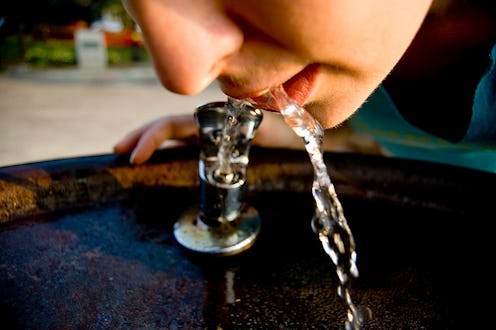Life
6 Crazy Facts About Drinking Water

Drinking water's pretty basic, right? Your body runs low, you nab yourself a drink, your hydration levels pop up to normal, and you're good to go. Nope, not even close. While we're often pretty good at discussing skin hydration and the effects of fluid consumption on the surface of our bodies, we're often hilariously clueless about what water does to our bodies once they're in them. The answer? A lot — some of it supremely unexpected.
The necessity of water for the human body's functioning, from the liver to the digestive system to the brain, is even more important to understand given that we live in a world where 750 million people worldwide lack access to clean water. That's more than twice the entire population of the United States. Some of the world's most exciting science right now is focused on getting as much fresh water as possible to the people who need it.
Plus, it's just plain awesome to take a drink and think about that fluid permeating our systems, plumping up cells all over the body, and setting off chain reactions that allow us to go about our daily lives. No? Just me? Wait till you read this. Then maybe you'll think about your 10 a.m. swig of water a little differently.
1. Water Eases Thirst Before It Actually Hits The Bloodstream
That refreshing feeling after you've taken a long gulp of water? It's far too rapid to actually be an immediate reaction to your drink — your body is just filling in the gaps. Thirst is triggered by the brain's detection that cells are shrinking as the body uses up its water, but you'll likely feel sated before the cells are actually filled with water again.
Why? It's something called an anticipatory reflex. The taste buds and gut register how much water (and how much salt) you've ingested, and make you feel sated so that you'll stop drinking at an appropriate point. If you just kept drinking while your cells were taking their sweet time rehydrating, you'd risk completely flooding your body.
2. Water Kick-Starts Your Kidneys
Kidneys are the body's filtration system, but they require a copious amount of water to do their job properly and boot unwanted toxins out. Without proper hydration, the kidneys become unable to filter the blood properly, and you risk all kinds of hilarious nasties, from kidney stones to disease. The kidneys can do a little to save water — by concentrating your urine to the color of a tangerine — but beyond that, you need water to keep it working.
Putting the kidneys under stress is a terrible idea — and, interestingly, they have a minimum amount of water that's required to be able to function properly. The usual thinking is eight glasses a day. People who've had a kidney stone need to drink a massive two to three liters (up to two-thirds of a gallon) a day to reduce their risk of developing another one.
3. Water Helps Your Cognitive Performance
Water is essential to the brain's performance — and some unfortunate souls had to prove it in a series of studies about how the brain reacts to dehydration. The short answer? Not well. Being deprived of water leads to short-term memory damage, working memory impairment, and a downgrade in your visual motor skills. Interestingly, it also goes the other way: one study in 2000 showed that hyperhydration, or a huge amount of liquid (in a very controlled laboratory setting) actually increased short-term memory.
4. Water Keeps You Happy
Studies have also shown that mild dehydration causes significant dips in mood, which should be an important fact if you suffer from depression or another mood disorder. Water: it's necessary for your happiness.
5. Water Reduces Joint Pain
Got an aching knee? Pick up the water bottle. Getting your proper amount of fluids is crucial to maintaining the right amount of cushioning in your joints. You don't actually have water balloons in your elbows and knees, though — you have something called synovial fluid, which is designed to lubricate the cartilage that protects your joints.
It's not a magic trick, unfortunately; replenishing your water levels won't necessarily kick the synovial fluid into overdrive and leave you with seamless joints forevermore. But good hydration is a necessary ingredient in keeping your joints happy.
6. Water Protects Your Spinal Cord
Water is a crucial part of one of the nervous system's most powerful protective mechanisms: cerebrospinal fluid. The fluid, as you may have guessed, circulates around the spine and the brain, forming a protective "cushion," clearing waste and stabilizing the system as a whole. The fluid is 99 percent water — and a drop in its volume or change in its concentration is obviously not a good idea for your body as a whole. But that's what happens if you get too dehydrated.
We don't exactly know how cerebrospinal fluid (or CSF, if you're feeling impatient) is formed in the body, but you don't have much of it at any one time — between 100 and 150ml at most. Still, that little bit is enough to make the brain floating in it feel basically weightless — hence, perhaps, why your head feels massively heavy if you've got a dehydration headache.
Now, if you'll excuse me, I'm feeling a little thirsty.
Images: David Salafia/Flickr, Getty (6)